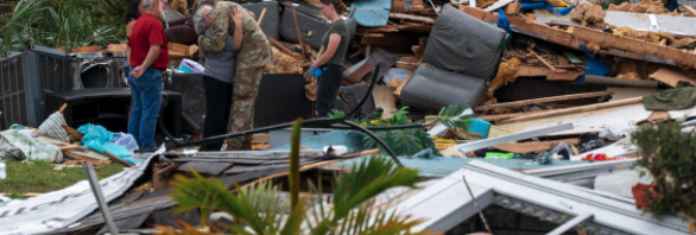Yet another FEMA fiasco in western North Carolina, where victims of Hurricane Helene have found themselves booted out of hotels in freezing temperatures due to—surprise!—bureaucratic incompetence.
Imagine surviving a hurricane, dealing with mold-infested homes, shattered windows, and zero safe options to return to, only to find out FEMA’s promised extension of housing vouchers somehow didn’t trickle down to reality. This isn’t just a mistake—it’s a textbook example of how government agencies can drop the ball when it matters most.
Here’s the kicker: FEMA had announced it would extend its Transitional Sheltering Assistance (TSA) program for hurricane victims until the end of March 2025. Sounds good, right? Except that didn’t stop dozens of families from being kicked out of their hotels on Tuesday night, with nowhere to go and temperatures dipping below freezing. North Carolina’s Republican senators, Ted Budd and Thom Tillis, were quick to sound the alarm, calling out FEMA’s disastrous handling of the situation. Both senators reported receiving frantic calls from constituents who suddenly found themselves out in the cold—literally.
A huge thank you to Newsmax for having us on late last night to talk about the INSANITY of families in #WNC getting kicked out of hotels by FEMA.
The government is failing the people of Western North Carolina and they MUST be held accountable. pic.twitter.com/XwFIxdh6lW
— Matt Van Swol (@matt_vanswol) January 15, 2025
Senator Budd took to social media, calling the situation “unacceptable” and demanding immediate action. Meanwhile, Senator Tillis described the conditions as dire, with families stranded in the bitter cold and homes still uninhabitable. He highlighted nonprofits stepping in to cover hotel costs while FEMA scrambled to figure out what went wrong. If you’re wondering why private charities had to step in to clean up FEMA’s mess, you’re not alone. This is the kind of government dysfunction that makes taxpayers want to pull their hair out.
FEMA’s explanation? According to the agency, hotel stays ended for those who supposedly had “habitable” homes or who weren’t eligible for assistance. But here’s the thing: many of these so-called “habitable” homes are anything but. We’re talking about places with mold, broken windows, and unsafe conditions. The fact that FEMA’s inspections didn’t catch this is a glaring failure. It’s one thing to tighten up eligibility criteria—it’s another to leave people stranded because your system can’t distinguish between “livable” and “barely standing.”
And yet they won’t let them stay here either…what is happening?!?
UNBELIEVABLE 🚨 North Carolina Hurricane Helene victims had someone come in and build 100 tiny homes as a donation
Victims “were living in them, and the county comes in and says they won’t pass inspection.” AND KICKS THEM OUT
“So we got 75 of them sitting down there that won’t… pic.twitter.com/LAE27roXKT
— Wall Street Apes (@WallStreetApes) November 21, 2024
To their credit, Budd and Tillis didn’t just throw their hands up in frustration. Budd’s team contacted FEMA leadership and worked through the issues “line-by-line, person-by-person,” ensuring some families were able to get back into hotels that same night. But the question remains: why was this necessary in the first place? Why does it always take a public outcry or political pressure for FEMA to do its job?
FEMA …. Is kicking Helene survivors out of temporary housing into snowstorms and freezing temperatures. I will post the link in the comments area ! This is unbelievable what they are doing to these people in western North Carolina.
Prosecute them all 🙌 up if you agree pic.twitter.com/E2lMSojDew
— Mischief 🌿🌹🌿🌹🌿🌹🌿🌹🌿 (@gracieback2) January 11, 2025
And let’s not ignore the broader context here. FEMA has faced growing criticism for its slow and uneven responses to recent disasters, particularly in conservative-leaning areas. This is the same agency that made headlines in Florida after a supervisor instructed workers to avoid helping homes with Trump signs. Are we supposed to believe this kind of bias doesn’t influence how resources are allocated? It’s hard not to wonder whether FEMA’s priorities are skewed when certain areas seem to get the short end of the stick.
The bottom line is this: FEMA exists to help Americans in their most desperate moments, not to become a bureaucratic nightmare. While some families have thankfully been rehoused thanks to the efforts of local nonprofits and lawmakers, the fact that this situation happened at all is an embarrassment. Victims of Hurricane Helene deserve better than to be left out in the cold because FEMA can’t get its act together. As Budd and Tillis continue to push for accountability, one thing is clear: if FEMA doesn’t fix its systemic issues soon, the next disaster won’t just be natural—it’ll be man-made.







